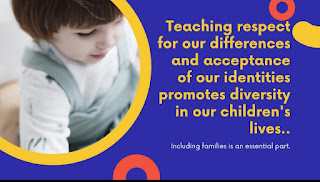Addressing diversity in early childhood settings
We dream of living in a world free of biases and discrimination. We dream of living in a world where everybody could feel loved, and included without feeling rejected or excluded. But this is not the reality we live in.
Every day we see people suffering from discrimination, racism, and other biases that hurt them affecting their worth, goals, dreams, and overall self. For me, the important factor to change that is to prepare children to celebrate, accept, tolerate, and respect diversity helping them to feel proud of their culture, traditions, beliefs, and family and at the same time, respecting, valuing, accepting, and tolerating other people regardless of their skin color, abilities, language or cultural backgrounds.
Put into practice the best skills to address diversity
📣Talk about diversity: racism, bilingualism, ableism, and sexism with other professionals to understand our own hidden biases to address diversity.
📣Understand and accept the traditions, routines, and beliefs of each child and their family.
📣Be open to knowing and learning from diverse children and families.
📣Develop effective communication skills to talk to families about their differences avoiding being critical.
📣Create an honest partnership with families.
📣Keep in mind that cultural differences are not bad or harmful.
📣Show respect, acceptance, and understanding to children and their families.
📣Adopt a culturally sensitive approach making a balance between the child’s culture and the new culture and practices.
📣Consider the parent’s goals and perspectives as well as the child’s personality.
📣Explain to families if a particular practice is harmful to their children.
📣Be aware of our non-verbal and verbal communication avoiding microaggressions.
📣Be open to establishing respectful conversations with families.
Suggestions for early childhood settings
🔎Teach anti-bias practices early.
🔎Reinforce learning that appreciates differences recognizing biases and stereotypes.
🔎Provide books, magazines, photographs, and tv programs showing and celebrating diversity.
🔎Be aware of the uncomfortable reactions and comments of children.
🔎Celebrate diversity with children reassuring them that differences are fine.
Contributing to the value of diversity and resisting prejudice
🔔Teach children to be critical thinkers understanding issues through examining and questioning.
🔔Respond to children's questions the best you can.
🔔Listen carefully to what children express.
🔔Shape your responses to the child’s age and personality.
🔔Share with families and colleagues ideas on responding to children’s questions to gain new ideas and insights.
🔔Model positive behaviors and attitudes toward diversity.
🔔Intervene with children if they are calling names about someone’s religion, race, ethnicity, or sexual orientation.
🔔Create opportunities for children to interact with others and make friends.
🔔Involve families in sharing their traditions.
🔔Create positive relationships with people who are different.
As early childhood professionals working with families, our contribution to talking openly with honesty and respect fosters positive feelings in children and families, making them feel valued by their cultures and traditions. Allowing children to develop a solid understanding of who they are and where they came from, develop confidence among other children, families, and communities that are different from theirs, which also contributes to building a world of respect, tolerance, acceptance, inclusion, and love.
Reference
Derman-Sparks, L., & Olsen Edwards, J. (2010). Anti-bias education for young children and ourselves. Washington, DC: National Association for the Education of Young Children (NAEYC)."DIVERSITY IS ONE TRUE THING WE ALL HAVE IN COMMON. CELEBRATE IT EVERY DAY. "
– Anonymous
_______________________
Diana A. Rivera is an Early Childhood Educator, with graduate studies in Educational Psychologist, and author of Be the voice for children. Diana believes and commits to the healthy development, growth, well-being, and learning of all children. The blog posts share ideas and knowledge about educational psychology, child and brain development, parenting, diversity, effective teaching practices, early childhood education, and care to support the empowerment of children and families.











